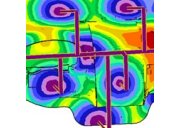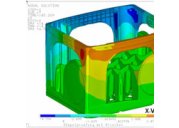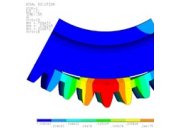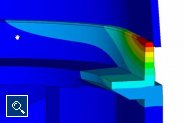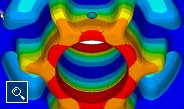Static load conditions
Using static calculations to correctly forecast the effects caused by component stresses
Component stresses can be of a static or dynamic nature. The static stresses include dead loads or additional static, external forces. Static simulation calculations as performed by the plastics simulation center demonstrate the deformation behavior of a component under defined load conditions or determine the permissible forces by a set maximum level of deformation. Typical load conditions occur during activation of operating elements, tilting movements (total component weight is weighing on a section) or when examining the buckling strength of doors or hatches e.g. in cars or various housing components, which are analyzed with static calculations. Stress peaks - amongst other things- reasoned by deformation of the moulded parts, will be localized with the aid of static calculations and can in many cases be decreased by means of design alterations (change of the load transfer, changed rib arrangement). The component stress and effects of stationary or non-stationary temperature impacts can also be simulated.
Constraints and selection of the material laws
The material model is selected depending on the stress period as well as the stresses and strains that occur. In this process linear, non-linear or hyperelastic material laws can be taken into account depending on the polymer structure (thermoplastic, elastomers, duromers). Most crucial for the quality of the calculation is the definition and consideration of the constraints such as:
- Geometric non-linearity in case of major deformations
- Loads with and without contact
- Loads with and without friction
- Consideration of anisotropy
Plastics simulation center
Amongst others the following calculations are performed in the Plastics Simulation Centre:
- Short-term tensile, compressive and shear stresses,
- Long-term tensile, compressive and shear stresses, (Creep calculations) as well as
- Internal pressure loading
- Thermal transfer and thermal expansion calculation
Examples
Dimensioning of:
- Welding seams
- Snap fits
- Optimisation of centres of gravity
- Loads on mechanisms (operating mechanisms, gears)
- Pressure reservoir (wall thicknesses, buckling behavior, joints)
As a specialist for the simulation of injection moulding processes and component stresses Impetus Plastics Engineering has so far demonstrated its expertise in hundreds of projects. The calculation of component variants, FEM simulations of load conditions, deformation situations and failure modes, structural analyses of glass fibre reinforced injection moulded parts as well as anisotropy tests can be found in the service portfolio.
